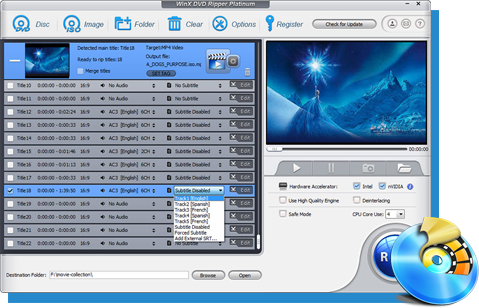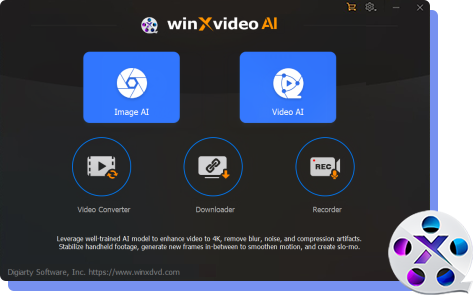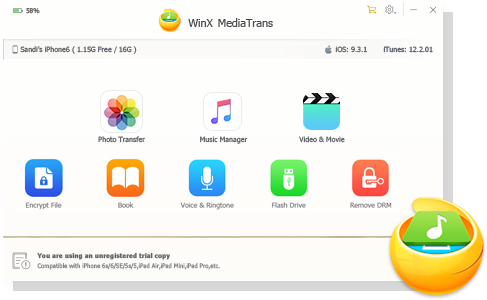HandBrake Speedup/Acceleration Tips - Make DVD Ripping Faster
- "It takes over an hour using Handbrake to convert a DVD to mp4 and 30-45 minutes to do a TV episode"
- "I usually try to put some kids DVDs on the iPad or Mac air before a trip. I open them with mactheripper and then convert with handbrake. The process takes 3 hrs on a 2 yr old iMac."
HandBrake is one of the most popular video transcoders available to rip DVD/Blu-ray disc and convert various videos on multiple platforms (Windows, Mac and Linux). It offers an easy and free solution to convert video and disc to digital as MP4 or MKV. But issues occur sometimes when ripping DVDs and transcoding videos, the typical one is HandBrake slow DVD ripping speed that can significantly impact your productivity. To optimize your DVD ripping experience and reduce processing time in HandBrake, it's essential to understand the key factors influencing performance and implement effective strategies to speed up HandBrake.
In this guide, we'll delve into the critical aspects of hardware optimization, software settings, additional techniques, and even HandBrake alternative for faster and more effective DVD to digital formats ripping.
HandBrake DVD Conversion Too Slow? Try the Fastest HandBrake Alternative
WinX DVD Ripper Platinum, the world's NO.1 fast DVD ripper can help convert DVDs with CSS, region code, FBI Warning, Sony ArccOS, Disney DRM and other schemes on latest DVD movies, 99-title DVDs, workout DVDs etc. that HandBrake can't crack. The support of Level-3 Hardware Acceleration empowers it to invoke Intel, NVIDIA and AMD GPUs to achieve 47x real-time faster DVD processing speed while keeping nearly lossless quality.
For Windows and Mac only. If you are a mobile user, please click here.
Handbrake Speed up Tips
Part 1. The Most Possible Reasons Why HandBrake DVD Ripping Is Slow
1. Google Chrome Slows Down Handbrake
When VideoToolBox is enabled, Google Chrome will make Handbrake slower by 30% (compared to Safari) though the GPU acceleration is supposed to speed up Handbrake DVD ripping/video transcoding. This is because Chrome locks down the low-level VideoToolBox framework and prevent other apps (including Handbrake) from accessing it.
2. Computer Configuration
HandBrake will run very slowly to rip a DVD on a low-end or older computer. The latest HandBrake 64-bit release can't run on 32-bit Intel Macs (2007 and eariler). HandBrake lists minimum system requirements to run this program:
For Windows and Linux:
- Processor: Intel Core 2 Duo, AMD Athlon X2
- Free Memory: 256MB for SD | 1GB for HD | 2GB for 4K
For Mac:
- 64-bit Inel Mac (2010 models and newer)
- Free Memory: 256MB for SD | 1GB for HD | 2GB for 4K
3. Video Codec
HandBrake wraps x265 encoder helping users convert DVD disc to H.265 MP4 or MKV to reduce size but keep quality of resulting file. However, many users involve in the trouble of slow x265 encoding speed. Actually, without GPU hardware acceleration, H.265 encoding needs a more powerful CPU to achieve a great performance. Otherwise, it will result in an extremely slow conversion speed.
4. Encoding Methods
2-pass encoding (available for x264 (10-bit), H.265 10-/12-bit, MPEG-4 and MPEG-2) can deliver a high quality of resulting file but lengthen DVD ripping process. If you switch to 1-pass encoding, the DVD rip will go faster. However, it comes at a trade-off of lower quality. If you want both the speed and quality, unfortunately Handbrake dosen't provide such an option. Try another DVD ripping software like WinX DVD Ripper Platinum, which hits the perfect balance between the speed, quality, and output file size.
5. Improper settings on Handbrake Quality
Constant Quality RF (CRF) targets a certain quality level. Some users apply the really low CRF for better quality, while it does nothing other than slowing down speed, and even getting Handbrake output file larger than input.
6. Source Disc
HandBrake work well to handle good DVD discs but encounter some problems when importing old, damaged or copy-protected ones. HandBrake will cost more time to scan DVD titles. It may run interruptedly because of bad/broken sectors or complex encryption schemes on DVD. some newly released DVD discs can't be converted at all.
Part 2. How to Speed up HandBrake for DVD Ripping on PC/Mac?
How can I speed up Handbrake? According to above-mentioned HandBrake slow reasons, we list the most effective and pointed ideas that are worth trying.
1. Upgrade Your Hardware
To accelerate your DVD ripping process using Handbrake, it's crucial to optimize your system's hardware.
Firstly, multi-core processors excel at video encoding tasks. By distributing the workload across multiple cores, you can significantly speed up the conversion process. HandBrake announces that it can scale well up to 6 CPU cores so that a hexa-core processor can boost speed maximumly. Use your system's Task Manager to monitor CPU usage and close unnecessary programs to free up resources.
Having ample RAM is essential for smooth video encoding. A larger amount of RAM allows your system to buffer more video data, reducing the need for constant disk access. Close other applications to dedicate as much RAM as possible to Handbrake.
Solid State Drives (SSDs) offer dramatically faster read and write speeds compared to traditional hard drives. Using an SSD as your system drive and for storing source files can significantly reduce load times and improve overall performance. Consider using an SSD cache for your hard drive to further boost read speeds.
2. Apply Proper HandBrake Settings
2.1 Select Proper Video Codec and Preset
HandBrake makes use of Intel QSV for H.264 encoding to greatly accelerate DVD to MP4 ripping speed. H.264 (Intel QSV) is the priority choice if you takes speed as the first important thing. H.264 (x264) is another choice if your Intel processor doesn't include QSV. Handbrake offers a range of presets from Ultrafast to Placebo(Very Slow). Select the Fast 1080p or Very Fast preset in Handbrake if you can accept lower quality. Faster preset means lower video quality and smaller video file size.
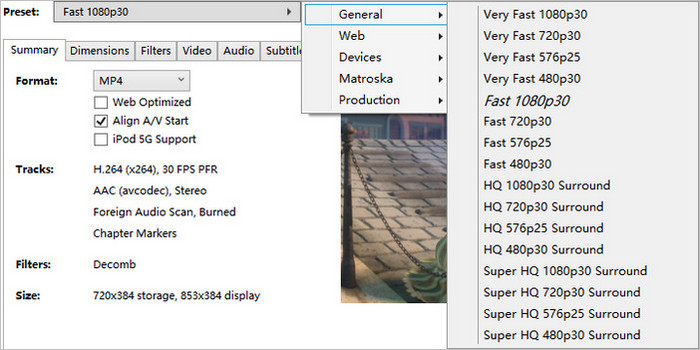
2.2 Select Proper Pixel Format
The choice of pixel format can significantly influence encoding speed. Simpler pixel formats, like YUV420P, require less processing power to encode due to their reduced color information. More complex formats, such as YUV444P, offer higher quality but can take longer to encode.
2.3 Apply Frame Rate That Suits Your Device
You can also choose to manually set your Handbrake settings. Besides the video codec and preset, choosing a frame rate that matches your target device. 30fps is often sufficient, but 60fps might be better for high-resolution displays or gaming. Lower frame rates can reduce file size but may affect smoothness.
>> Learn more about Intel QSV Support in HandBrake
>> How to Enable NVENC Encoder in HandBrake?
3. Install libdvdcss to Rip CSS-protected DVD
Users who try to rip copy-protected disc with HandBrake usually experience slow ripping speed and eventually go to a failure because HandBrake isn't armed with the feature to remove encyprtion from DVDs. libdvdcss is a software library which can circumvent CSS encryption on DVDs. With this tool, HandBrake can convert CSS-protected discs with ease.
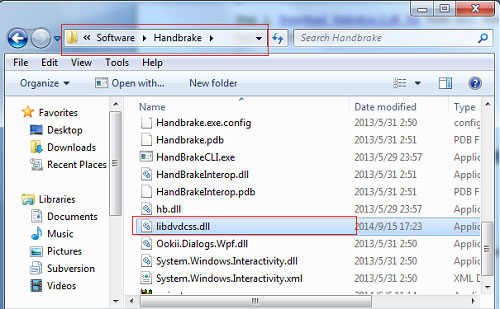
4. Operating System Optimization
To speed up your HandBrake encoding, you can set your power plan to High Performance to ensure that your system is using its full potential. This will prevent power-saving features from throttling the CPU or GPU. Also, closing any unnecessary background applications to free up system resources. These applications can consume CPU and memory, slowing down the HandBrake encoding process.
5. Customize HandBrake Settings
To further optimize your DVD ripping experience, explore Handbrake's custom settings to fine-tune the encoding process. For example, adjusting the bitrate can directly impact file size and quality. Monitor your CPU usage during encoding; if it's consistently high, consider reducing quality settings or using a less demanding preset. If your graphics card supports it, enable GPU acceleration for faster encoding. For advanced users, VirtualDubMod can be used to remove unwanted parts of the video before encoding, potentially saving time.
6. Get an Alternative to HandBrake to Speed up DVD Ripping - Recommended
If you follow all above tips but still dissatisfy with HandBrake ripping speed, it is suggested to get a faster DVD ripper as an alternative to Handbrake.
WinX DVD Ripper Platinum is such a perfect tool to rip ANY DVD to MP4 (H.264), AVI, WMV, MOV, or iPhone, iPad, Android, Windows Mobile, TVs, Xbox, Sony PSP, etc. Besides unprotected home-made DVDs, it works as DVD decrypter to bypass CSS, region code, RCE, Sony ArccOS, Disney DRM and other schemes on latest DVD movies/TV shows, workout DVD and even some special discs that HandBrake can't handle.
To deliver a faster experience and higher effiency, this HandBrake alternative takes full advantage of Intel QSV, NVIDIA NEVNC/CUDA and AMD to active hardware encoder and decoder to accelerate DVD ripping speed while hardware processing helping output a great quality (nearly lossless). Thanks to hardware acceleration, CPU is free for other tasks instead of fully occupied for DVD ripping.
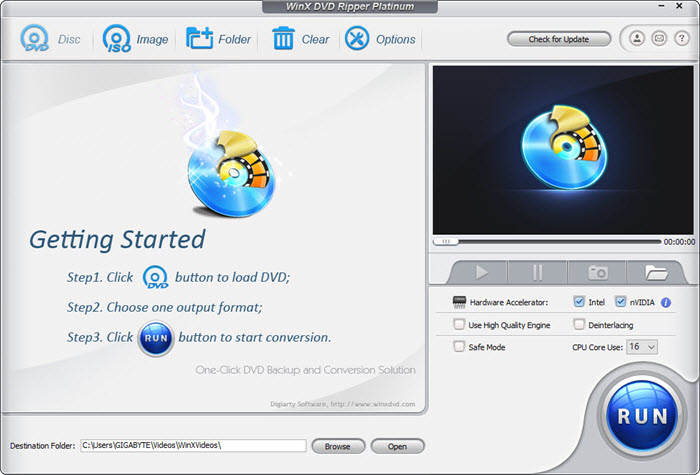
Conclusion
By strategically optimizing your hardware and software settings, you can dramatically speed up DVD ripping with Handbrake. Consider factors like CPU power, memory allocation, storage speeds, and software configurations. By following the tips in this guide, you'll enjoy faster DVD conversions and increased efficiency. Experiment with different settings to find the best combination for your specific needs and hardware. With a bit of optimization of HandBrake, DVD ripping can become a quick and painless process.
Related External Source from Wiki:
1. HandBrake - HandBrake is a free and open-source transcoder for digital video files, originally developed in 2003 by Eric Petit (a.k.a. "titer" from his SVN repository username) to make ripping a film from a DVD to a data storage device easier. Since then, it has undergone many changes and revisions...
2. DRM - Digital rights management (DRM) is a set of access control technologies for restricting the use of proprietary hardware and copyrighted works...


